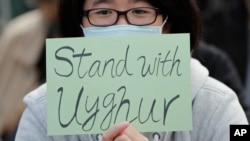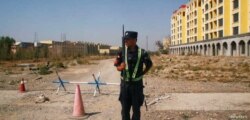After China threatened to sue them for their research on the Uighur crackdown, a think tank and a scholar say they stand by their work on the human rights violations against the Muslim minority in China’s northwest region of Xinjiang.
The Australian Strategic Policy Institute (ASPI) and U.S.-based researcher Adrian Zenz have gained international attention in recent years for their investigative papers focusing on China’s policies toward the Turkic-speaking minorities in Xinjiang.
Beijing’s Chinese Communist Party (CCP) now wants to take legal action against them for allegedly publishing “disinformation about China for libel.”
“Overall, I think our research has the CCP rattled,” said ASPI executive director Peter Jennings.
Accusing Beijing of efforts to undermine free speech, Jennings said that ASPI reports on the region were based on verified sources coming from China.
“In their own offensive way, they are doing their best to pressure ASPI and smear researchers around the world in an effort to stop shining a light into the behaviors of the Communist Party,” Jennings told VOA.
On Wednesday, China’s Global Times reported about the Chinese government’s intention to sue ASPI and Zenz. A day later, Chinese government spokesperson Zhao Lijian told reporters that he was not surprised about the possible lawsuit, claiming “Chinese and foreign media have exposed multiple times those behind Zenz and the ASPI.”
Zhao said he “advises” Zenz and ASPI to “come back to the right course as soon as possible, because too many vile deeds will inevitably lead to one's self-destruction.”
In recent years, both ASPI and Zenz have published several research papers on China’s campaign, most notably on Uighurs who have been subjected to state surveillance, arbitrary detention, forced labor and birth control in Xinjiang where, according to United Nation estimates, more than 1 million Uighurs and other Turkic Muslim minorities have been detained in internment camps.
Forced labor
In a report published in February titled “Uyghurs for Sale," ASPI said it found the Chinese government facilitating the mass transfer of over 80,000 Uighurs from Xinjiang to work in factories across the country under conditions that strongly suggested forced labor. The Uighurs, ASPI claimed, included those previously held in detention camps and taken to factories that were in the supply chains of at least 83 well-known global brands.
The ASPI report was referenced in March by a group of U.S. lawmakers who introduced the Uyghur Forced Labor Prevention Act. Last week, the U.S. departments of State, Treasury, Commerce and Homeland Security issued a joint business advisory to caution businesses about the risks of supply-chain links to forced labor in Xinjiang and elsewhere in China.
Zenz, a senior fellow of China studies at the Victims of Communism Memorial Foundation, told VOA that his latest article about mandatory sterilization of Uighur women in Xinjiang has triggered alarm bells and prompted a Washington Post editorial that called the policies of China in Xinjiang “a demographic genocide” aimed at reducing the Uighur population.
“My research is based on analyzing China’s own documents,” said Zenz, adding that his last findings about human rights in Xinjiang has shifted the debate to another level.
“People are starting to refer to China’s policies in Xinjiang as genocide. Beijing is really feeling the pressure. I think this is a sign that they’re getting more desperate,” Zenz said.
Silencing critics abroad
According to some experts, the threat by China against ASPI and Zenz are the latest attempt by the communist regime to force Uighur experts abroad into silence.
Michael Clarke, an expert on history and politics of Xinjiang at Australian National University, told VOA that Chinese authorities have long attempted to label both as biased.
China “in the recent past sought to cast doubt on Zenz’s objectivity by attacking his own religious faith and linking it to a perceived alignment with certain political actors/persuasions on the right of American politics,” Clarke said.
Meanwhile, the Chinese government called ASPI a mouthpiece of the Australian defense department, said Clarke.
“While this is true, (ASPI does receive significant funding from Australian Department of Defense), it, of course, does not invalidate its findings,” he said.
Donald C. Clarke, a professor of law at The George Washington University Law School, warned that by pursuing the “harassing” litigation, China is trying to “bankrupt the defendant.”
“This weapon of intimidation is effective only to the degree that Western countries allow it to be effective, since it uses those countries’ legal institutions,” Clarke told VOA.
Michael Clarke and Donald C. Clarke are unrelated.
This tactic is not risk-free for China.
“Any litigation will attract attention. .... It is going to result in an official court verdict that claims about Uyghur detention are not false. Does China really want that?” said Clarke.





